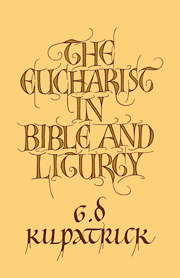Lecture IV
The nature of the Eucharist: (1) Passover, sacrifice and the holy
Published online by Cambridge University Press: 29 September 2009
Summary
The nature of the Eucharist: (i) Passover, sacrifice and the holy
The third lecture treated Luke's account of the Last Supper. Part of the argument dealt with the evangelist's attempt to make the Last Supper look more like a Passover. In making this suggestion I obliquely raised the question: ‘Is the Last Supper a Passover?’ We may now go on to ask: ‘If it is not a Passover, what is it?’ It is with these questions that we shall now concern ourselves.
At first sight there seems to be no question. As we saw, Mk. xiv.12–17 is explicit: the forthcoming meal is a Passover. Matthew and Luke repeat this information without question. The only difficulty we might find in this is that when we get to the account of the meal in Mark and Matthew it does not read like an account of a Passover.
Our real difficulty comes when we turn to John. Mk. xiv.12 reads ‘And on the first day of unleavened bread when they used to sacrifice the Passover lamb his disciples said to him: “Where would you have us go and make ready for you to eat the Passover?”’ This is followed by Matthew and Luke and is clear enough. The Passover lambs were slaughtered that afternoon and the Passover meal took place that night. Jesus' arrest and appearance before the Sanhedrin followed. The next morning he was brought before Pilate, who condemned him to death, crucifixion followed and Jesus died about 3 o'clock that afternoon.
- Type
- Chapter
- Information
- The Eucharist in Bible and Liturgy , pp. 43 - 58Publisher: Cambridge University PressPrint publication year: 1984



